This home comes with yoga, sound baths, star energy healing — and 95 roommates
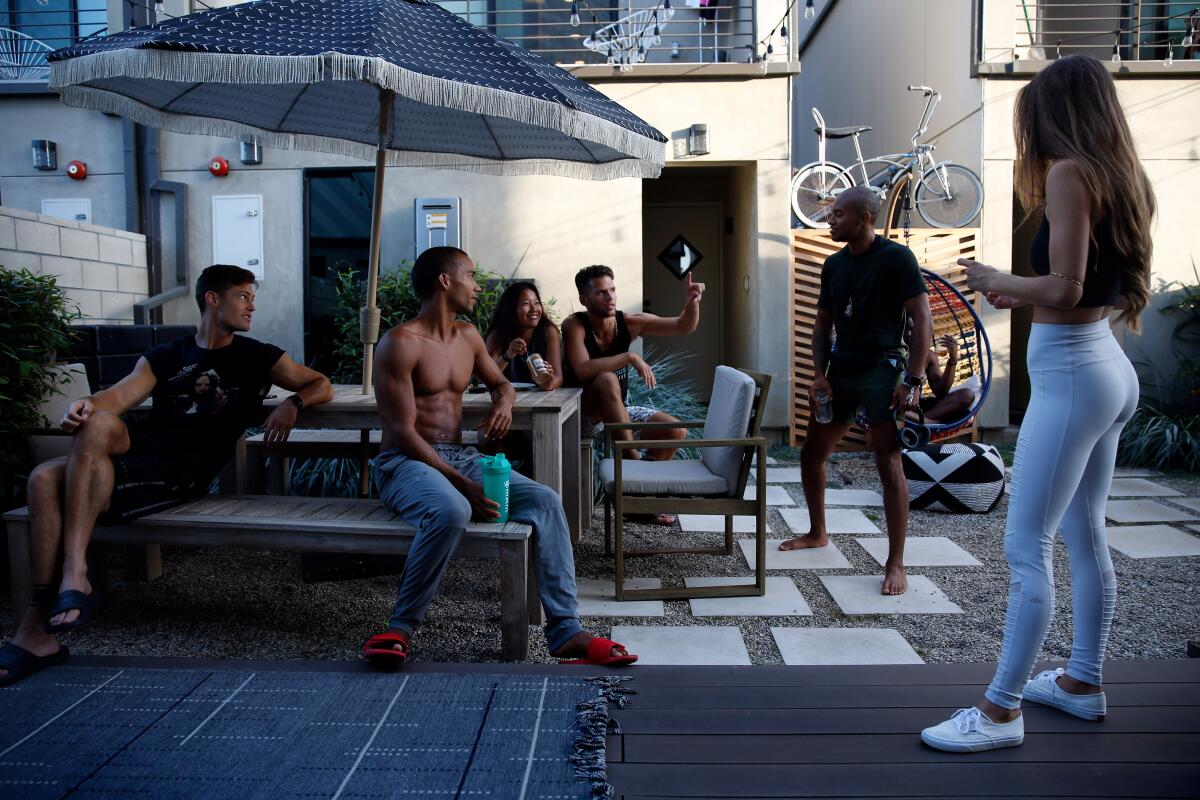
- Share via
On a recent Friday evening, two dozen young men and women shuffled to a backyard patio aglow in string lights. Most were heavily tattooed and wearing several beaded bracelets. A few wore tie-dye tank tops. All carried a stainless steel water bottle like an adult security blanket.
They listened attentively as celebrity chef Seamus Mullen conducted a cooking lesson, discussing the importance of food as “nourishment” while pointing to a bouquet of squash. Then, much like a home-economics class, the group was broken into four groups, each responsible for cooking an assigned dish.
This is but one of many events at Haven Coliving, a fully furnished adult dorm in Venice dedicated to wellness. When these residents aren’t sleeping in a pod-style room with up to half a dozen strangers, they’re treated to a full lineup of Goop-friendly activities.
“People want to be around other people, to share experiences. Haven makes it really easy. It’s all just happening downstairs,” said Katie Shim, 25, a yoga teacher who has lived here since an April beta opening. (Haven opened to the public in July.) Laughing, she added, “and it helps that this place is in Venice Beach.”
The complex is made up of four combined houses and encompasses everything a health-conscious millennial might need, including a gym, co-working space, yoga studio, rooftop lounge, barbecue, movie theater and outdoor meditation area. In addition, Haven offers a wide range of programming such as sound baths and full moon circles.
This summer it hosted a “star energy healing” event described as suitable for both beginners and experts of safe interdimensional travel. “Bring your crystals and water,” read the flier.
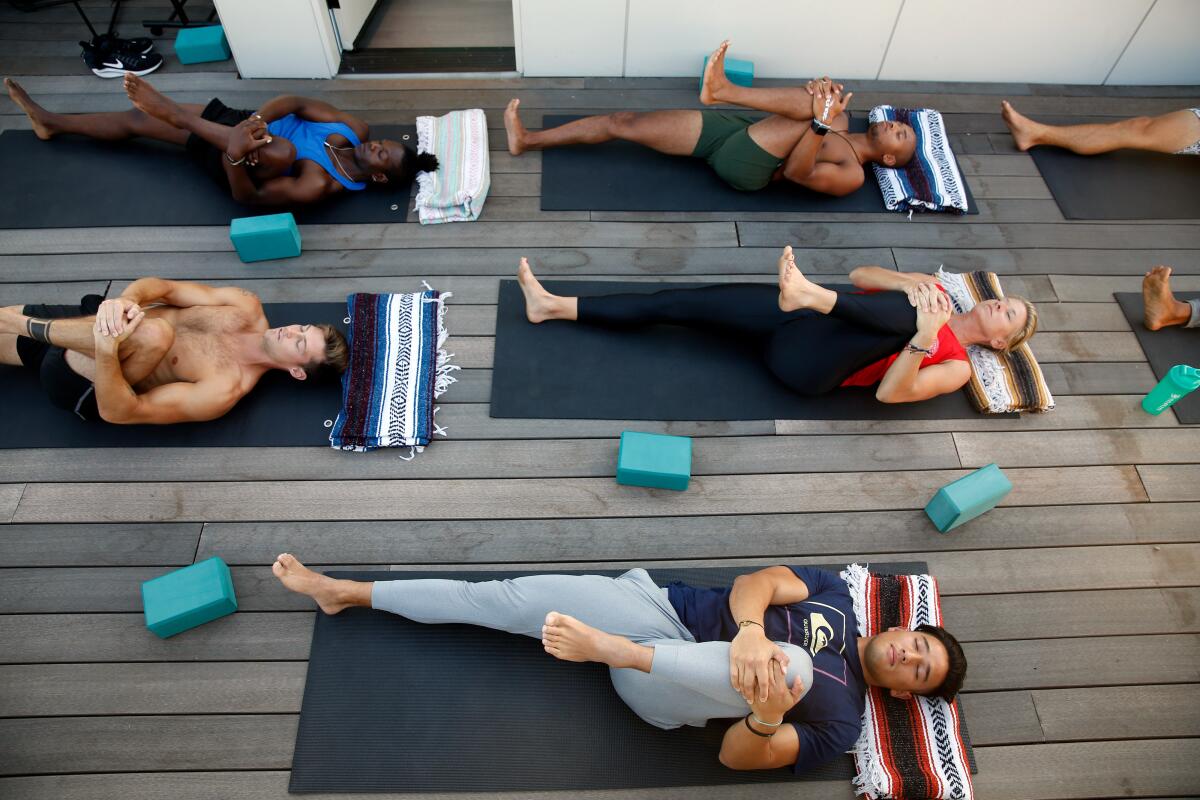
Sandwiched between single-family homes on a residential street, Haven is less than a mile from the beach. The self-described “purpose-driven living” compound houses 96 individuals, most of whom work in the $4.2-trillion wellness industry: fitness influencers, meditation teachers, nutritionists, cannabis entrepreneurs and reiki masters among them. A 9-to-5 gig is rare here, as residents devote as much time to their mind-body as they do their jobs.
The Haven fridge, for example, advertises a startup legal class beside dynamic breathwork workshops.
The aesthetic and decor mirror residents’ interests. Meditation cushions and crystals are scattered about the cozy, open-air living rooms. Surfboards line the wall; potted succulents grace coffee tables and cabinetry. Aromatherapy scents waft throughout the premises.
“We wanted to create a place that, even though it costs $995 a month, it feels like you are living at Canyon Ranch,” explained Haven Coliving co-founder Ben Katz, 40, while hanging with residents in the backyard. Katz previously served as the chief executive of Card.com, which sells prepaid cards. He co-founded Haven Coliving with business partners Robert O’Neill and Ari Chazanas.
Hustling and namastes aside, Haven invokes a strong sense of serenity. It’s a calm, quiet place where housemates can be found lounging in activewear and reading each other’s tarot cards. It’s like “The Real World” but more Zen.
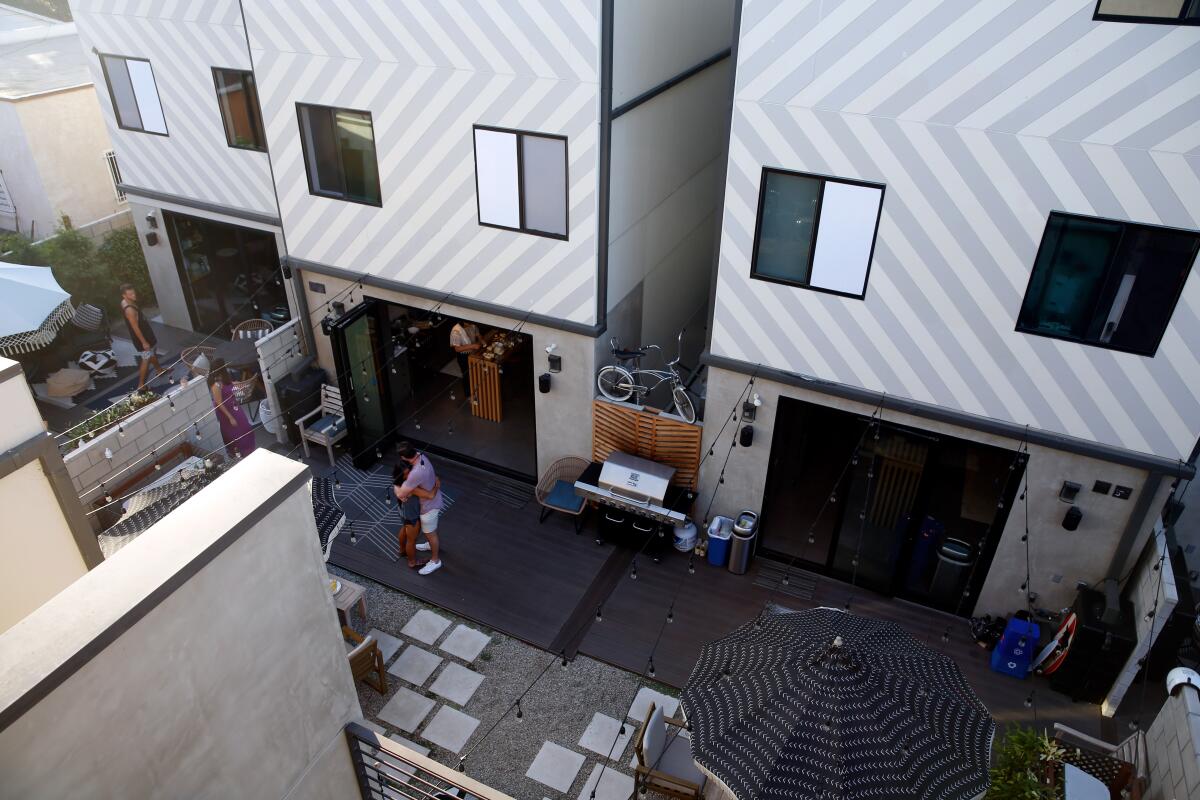
Relaxing outdoors, De’Andre Sinette, 25, described a typical day at Haven.
The yoga instructor wakes up in a 350-square-foot bedroom — filled with full-mattress bunk beds — which he shares with six other men. He saunters downstairs to a communal kitchen used by 23 others to drink tea (never coffee) and write in his journal. Midmorning, he joins housemates on a walk to the beach. Nestled on the warm sand, the group meditates before taking a swim in the ocean.
Sinette then heads home to sprawl out on the living room couch and tend to his social media. Sometimes he indulges in a deep conversation with a friend that lasts hours. Midafternoon, he bikes to teach a yoga studio class, then hits up organic grocer Erewhon for dinner supplies. With his housemates, he cooks up a vegan meal that they eat on backyard picnic tables.
“I feel like I’m on permanent vacation living here,” Sinette said, laughing, as a fellow housemate stopped to massage his shoulders. “It doesn’t even feel like real life. But it is real life.”
‘This is far from a frat house’
Arianna Grande plays over speakers as the group chats and cuts vegetables for their guest chef. Throughout the hour, not one glances at a phone or reaches for alcohol. In fact, barely any of Haven’s residents ever drink.
“I think house No. 3 had some wine once?” notes one female resident who asked that she not be identified by name. (She works in a more traditional sector and fears co-workers’ judgment of her housing situation.) “There’s CBD sometimes.”
As community manager James McMillian, 30, puts it: “This is far from a frat house.”
Outsiders may presume arrested development when they hear adults opt for dorm-style living. That, or they’ll respond with “How’s the cult?” says Meghan Kraft, 29, a creative consultant for health and food brands. “People don’t get it. They think it’s a hostel.”
Co-living facilities, however, address a mix of economic necessity and a need for community. With Los Angeles rents soaring — the average one-bedroom unit rents for $1,755 a month — a growing percentage of gig workers and young entrepreneurs simply can’t afford to live on their own, let alone pay for what Haven offers at their doorstep — office space, Wi-Fi and boutique fitness classes. Many don’t even have the credit record or security deposit to rent an apartment.
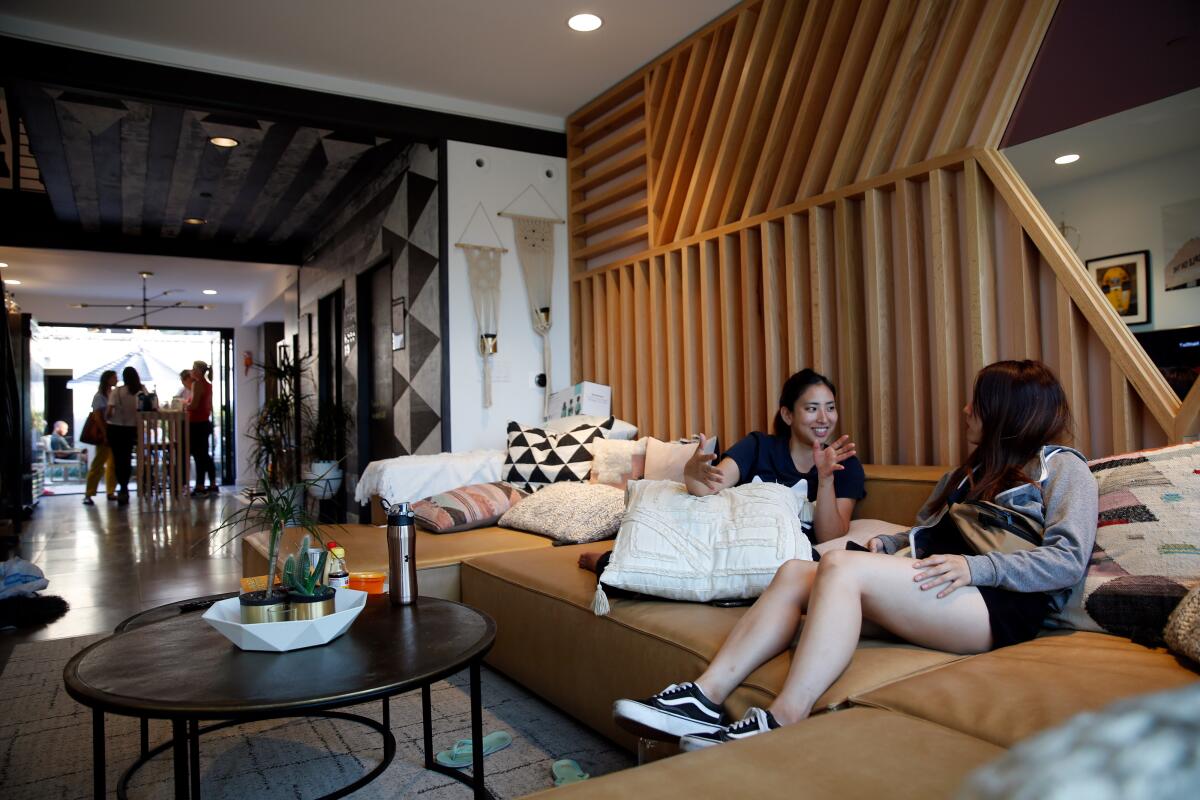
Few seem bothered by possessing what amounts to a suitcase of clothes and the few tchotchkes that decorate their bunk bed. Stuff, they say, is just clutter. This is a generation that puts a premium on experiences, and owning less means more money to spend elsewhere.
At any moment, says Sinette, he could just go abroad: “I could get some crazy opportunity to go to Bali. Who knows?”
Haven joins a host of co-living developments sprouting across Los Angeles that appeal to millennial sensibilities. Treehouse, scheduled to open this month in Hollywood, targets wellness enthusiasts by way of biophilic design and Olympian-led workout classes. Unlike Haven, it offers 60 private units. Prices start at $1,788 and include a family-style dinner every Sunday.
Treehouse board chairman Joe Green said a substantial number of applicants are single transplants craving connection. In many ways, he sees the co-living trend emulating early 20th century San Francisco, a time when nearly a quarter of the population lived in residential hotels.
“L.A. is one of the most unaffordable markets in America, and it can also be a very isolating place,” Green said. Co-living “offers you a place where you come back and you feel really supported. You’re not just sort of an anonymous person wandering home.”

Roughly 20% of Haven residents are new to L.A. and eager to expand their personal and business circles. The remainder speak of the city’s vastness and the difficulty of finding a dedicated “tribe” to belong to. The majority expect to live there for nine months.
Here, not one but several people will ask you how your day was. You’re greeted by hugs in lieu of hellos. One women’s bathroom wall is covered in Post-it notes of motivational declarations such as “I trust my intuition fully” and “My life is unfolding exactly as it is meant to be.” Those hang alongside a weekly chore chart to clean toilets and sweep the floors.
There’s also a sense of accountability that comes with dozens of people devoted to healthier living. “I’m not gonna bring McDonald’s here,” Sinette said. “They’ll be like, ‘What the hell are you doing?’”
There are, however, plenty of inconveniences. Haven enforces quiet hours at 10 p.m., at which point outsiders are banished. As for hookups? Sex is not permitted in pods or in communal spaces.
“You have to find an Airbnb in Topanga,” said Rob Starbuck, 31, a breathwork instructor who has lived at Haven for four months. “Or find someone who will let you go back to their place.”
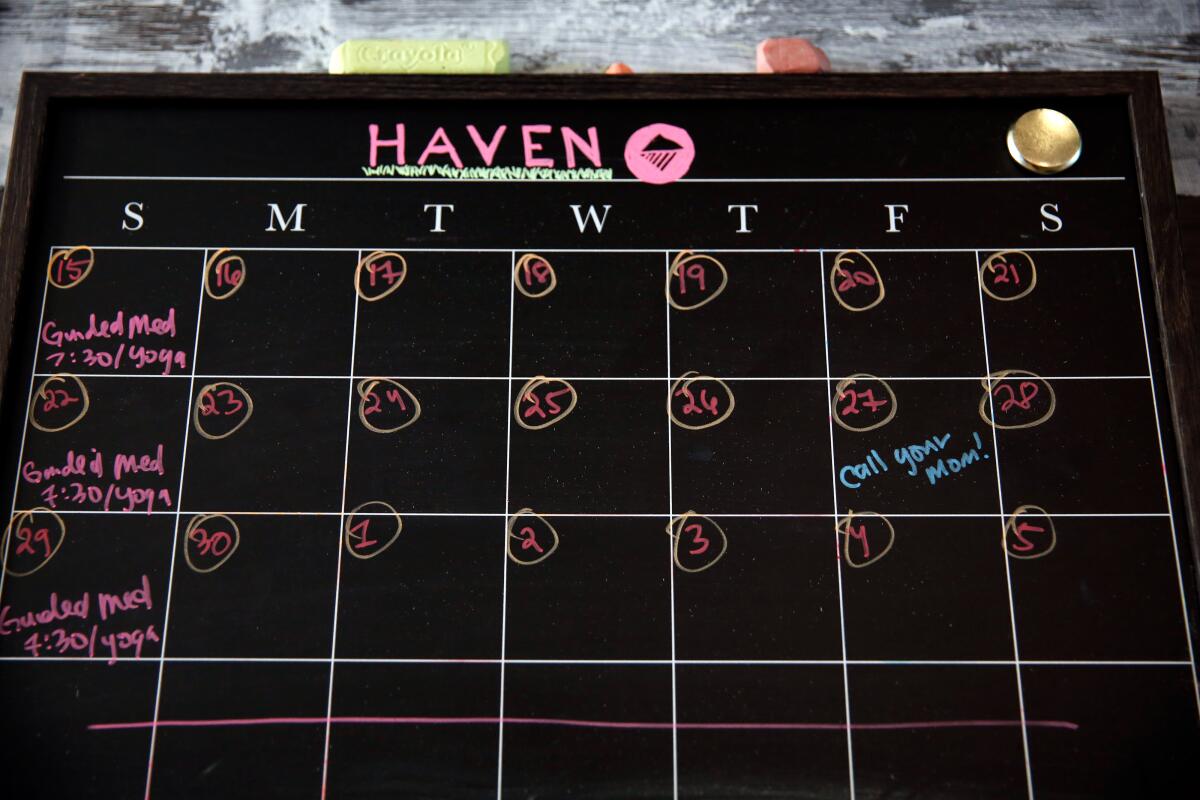
Kraft acknowledged the challenges of sharing one bathroom with seven women. If she wakes up when someone is already showering, she’ll need to wait to pee. Alarms go off at all morning hours (hitting the “snooze” button is frowned upon). Yet Haven residents reframe such inconveniences: Daily struggles are opportunities for “growth” or a way to cultivate “gratitude.”
“It’s easy to think that when we want something, it should be available to us,” said Kraft, who believes Haven made her a more patient communicator. “But you then need to realize there are other people around you need to adapt to. I think it makes you a better person.”
Likewise, Sinette says he prefers sleeping with a group of strangers to when he shared a Century City penthouse with just one roommate. He’s never had deeper sleep and says he is “100 times happier” for a simple reason: He has people to talk to in the morning.
“I can never go back to living alone or even with just one other person,” Sinette said.
Looking for individuals ‘on a journey’
The positive — nearly magical — thinking emanating from Haven is by design. New members fill out a six-page application in which they set “intentions” for both personal development and community contributions. Management requires residents to complete two hours of community service a month, which can take the form of volunteering for a local garden or offering one’s talent to Haven. Some simply lead a meditation class for their housemates.
Five on-site community managers serve as a cross between referee and college resident adviser. It’s their job to ensure residents meet the goals listed in their applications.
In interviewing new candidates, community manager James McMillian says he searches for individuals “on a journey,” not just people looking for cheap rent. Following thorough background checks, it usually comes down to: “Do they seem sociable? Are they in a stage of growth?”
For the most part, Haven fields interviewees who range from their early 20s to mid 30s. The average age is 27, with 60% of residents skewing female. But management stresses it would consider anyone 18 or older provided they mesh with the culture. McMillian recently interviewed a 62-year-old man he described as ideal.
“He practices yoga and has his own spiritual practice,” McMillian said. “He’s extremely mindful.”
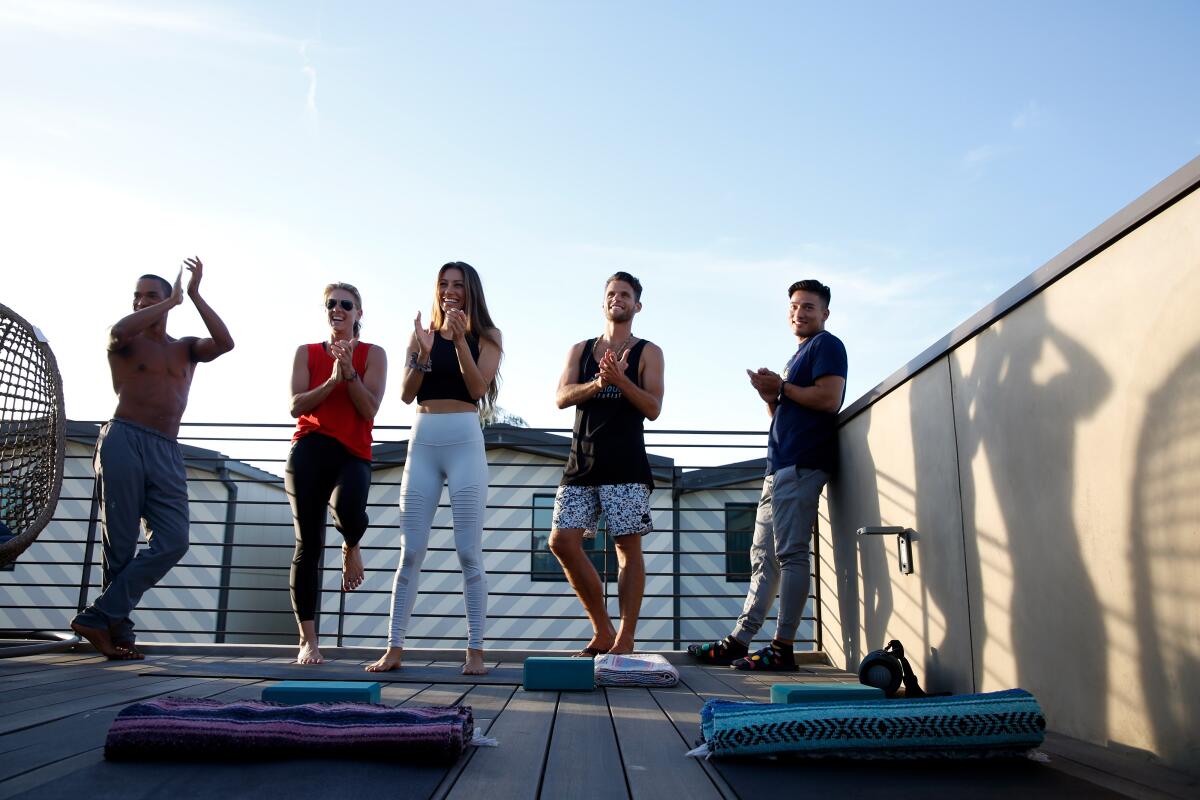
Haven’s own journey will extend far beyond the Westside. By December, the company plans to open two more complexes, one in Echo Park and the other in West Hollywood. After that, it will delve into other high-priced cities such as Seattle and Washington, D.C. Down the line, Haven wants to develop an entire alumni network and list-serve.
“Our goal is to eventually have hundreds of thousands of people who have had this Haven experience of togetherness … a tightknit group of people who share common passions,” Katz said.
Those common interests are key to building a thriving network. Bailey Richardson, co-author of “Get Together: How to Build a Community With Your People,” stresses the importance of setting a clear cause or set of interests, stating, “the stronger the why is to the who, the more likely you are to be able to get people together.”
Need-based communities can be tricky, but centering housing around wellness might give it more weight. It could propel millennials whose loneliness often includes a heavier element at play — a gnawing search for meaning.
“This country is so capitalist, and people are left with their work as their source of everything,” Richardson explained. “There’s a real desire to construct some semblance of a family unit.”
Shim said housemates are mostly disillusioned by mainstream markers of success. Many quit the rat race after getting to the top and asking: Why am I here by myself?
Despite the strong friendships forged, Haven’s community is still a transient one. It experiences a 10% turnover per month as residents move out or leave the city. A few find love on campus and venture out to cohabitate.
Haven residents naturally view such ongoing departures in a more spiritual light. “That’s the ebb and flow of life,” mused Haven resident Shim.
There are plenty of individuals who wouldn’t mind staying long beyond the expected Haven residency. A few have no desire to live anywhere else.
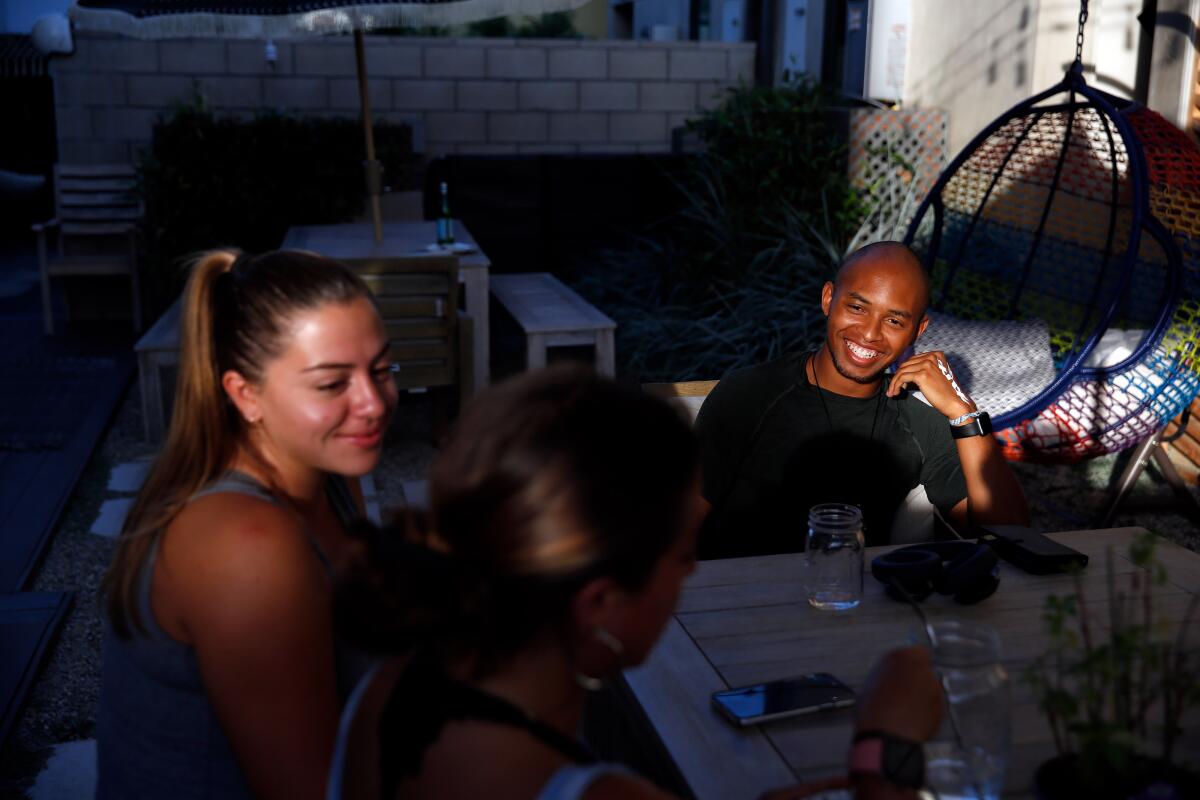
Sinette reclined into his chair and exhaled: “I’m so happy here that I don’t care if I don’t ever leave.”
More to Read
Sign up for The Wild
We’ll help you find the best places to hike, bike and run, as well as the perfect silent spots for meditation and yoga.
You may occasionally receive promotional content from the Los Angeles Times.










